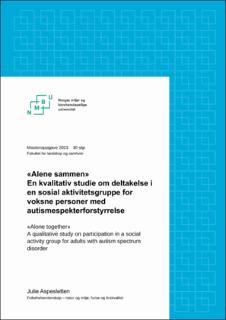«Alene sammen» En kvalitativ studie om deltakelse i en sosial aktivitetsgruppe for voksne personer med autismespekterforstyrrelse
Master thesis
Permanent lenke
https://hdl.handle.net/11250/3078984Utgivelsesdato
2023Metadata
Vis full innførselSamlinger
- Master’s theses (LandSam) [1166]
Sammendrag
Bakgrunnen for denne oppgaven er at voksne mennesker med autismespekterforstyrrelse (ASD) opplever lite tilgang til tilrettelagte fritidsaktiviteter og står i fare for å miste tilgang til sentrale arenaer som en meningsfull fritid, etablere kontakt med andre, knytte vennskap og sosialt samvær. Muligheter til å ha en aktiv fritid er viktig i et folkehelseperspektiv. Forskningen på voksne med ASD er mangelfull, og fagfeltet mangler dybdekunnskap om hvordan tilrettelegge for fritidsaktiviteter.
Hensikten med denne studien er å undersøke hvilke opplevelser og erfaringer voksne med autismespekterforstyrrelse har med å delta i en sosial aktivitetsgruppe. Kunnskapen kan danne grunnlag for hvordan tilrettelegge et helsefremmende tilbud for denne populasjonen med mål om økt deltakelse og inkludering i fritidsaktivitet, samt være utgangspunkt for videre forskning.
Kvalitativ metode er benyttet for å få en forståelse av sosiale fenomener ut fra informantenes perspektiv. Det er gjennomført semistrukturert dybdeintervju. Ni voksne personer med ASD i alderen 24-50 år er intervjuet og alle er rekruttert gjennom en aktivitetsgruppe for voksne med ASD. Datamaterialet ble analysert ved bruk av tematisk analyse.
Funn i denne studien viser at mange i stor grad opplever utfordringer knyttet til sosial deltakelse og ønsker noe å gjøre på fritiden, sammen med andre. Deltakelse i aktivitetsgruppen gir mulighet til å ha noe å gjøre, sammen med andre, møte likesinnede og oppleve variasjon og mestring i hverdagen. Faktorer som faste rammer, forutsigbarhet og en felles forståelse var viktige for at sosial interaksjon og aktivitet i gruppen opplevdes positivt. Aksept og forståelse for hverandres ulike sosiale behov og relasjonelle væremåter, var av stor betydning for opplevelse av trygghet, fellesskap og tilhørighet i gruppen.
Resultatene kan bidra med kunnskap om betydningen av å delta i en tilrettelagt aktivitetsgruppe for voksne med ASD. Videre kan de bidra med kunnskap om hvordan tilrettelegge og hvilke hensyn som bør tas ved utviklingen av slike grupper. Betydningen av å delta i sosial aktivitetsgruppe for voksne med denne diagnosen trengs å utforskes mer. Adults with autism spectrum disorder (ASD) experience little access to organized leisure activities and are at risk of losing access to central arenas such as meaningful leisure time, socializing and forming friendships. Opportunities to have this is important from a personal and public health perspective and research in the field lacks in-depth knowledge of how to facilitate leisure activities for this population.
The purpose of this thesis is to explore what experiences adults with ASD have while participating in an organized social activity group. The knowledge could form the basis for how to organize a health-promoting offer for this population with the aim of increased participation and inclusion, as well as being a foundation for further research.
Qualitative research methods were used to gain an understanding of the social phenomena from the perspective of the informants. Nine adults aged 24-50 that were recruited through an activity group for adults with ASD and they were interviewed using semi structured in depth interviews. Furthermore, the data was analyzed using thematic analysis.
The findings show that many of the informant’s experience challenges related to social participation and generally want something to do in their free time. The activity group offers numerous benefits, providing the participants the opportunity to have something enjoyable to do, but also to foster meaningful connections with like-minded individuals. By participating, they may enhance their everyday life by experiencing a diverse range of activities and gaining a sense of mastery in them. The concrete framework, predictability and a common understanding was important and participation in the group was perceived positively. Recognizing and embracing the diverse social needs and relational styles plays a pivotal role in fostering a sense of security, community, and belonging in the group.
The findings have the potential to enhance our understanding of the significance of engaging in organized activity groups for adults with ASD. Moreover, they can provide valuable insights into group facilitation and inform the development of these groups by highlighting essential considerations. It is imperative to delve deeper into the exploration of the benefits associated with participating in social activity groups for adults diagnosed with ASD.
